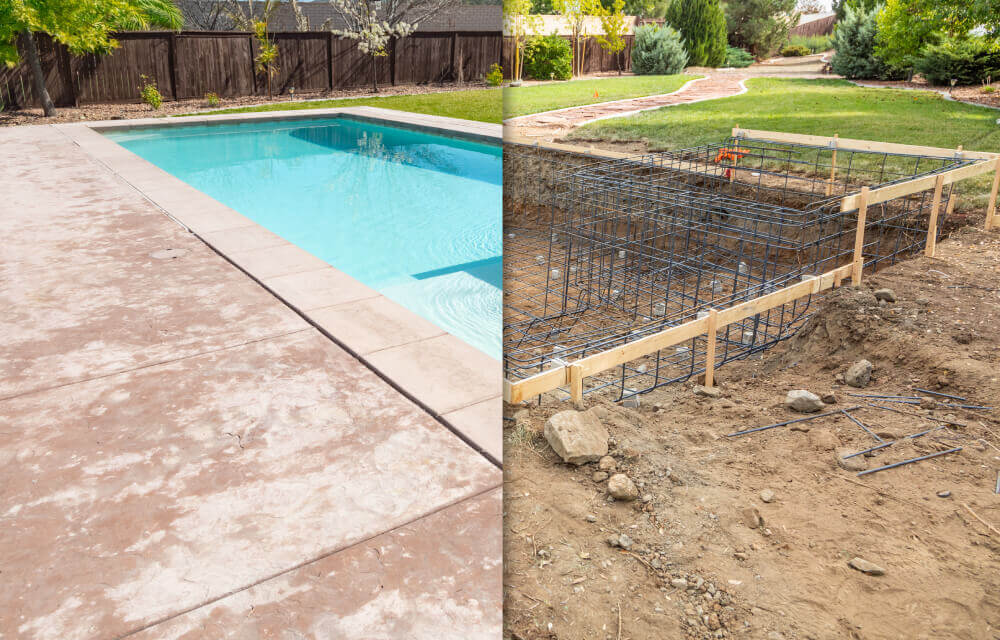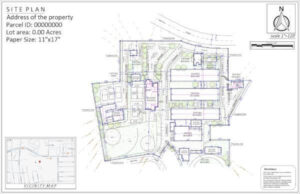
Building Codes for Decks – Requirements & Specifications
Building a deck is a great way to transform your outdoor space into a more appealing and functional area for relaxation and entertainment. To ensure the deck’s safety and durability,
This is Not a Legal Survey


Contributing Writer | Architecture & Design Writer
Planning to build a pool? Congratulations! We’re guessing you already have the perfect design in mind and you’re probably already picturing yourself lounging and sunbathing by your pool. But then comes the reality check, what about permits?
Trust us, we understand. No need to worry. In this guide, we’ll explain everything you need to know about pool permits, how to get them, how much they cost, and the different types of pools you can use them for.
Without further ado, let’s get started.
Table of Contents
ToggleWhen planning to build a new pool, our advice is to contact your local municipality and inquire about obtaining a pool packet. This package typically includes all the necessary documents such as permit application and building codes and regulations (the same applies if you’re planning a major project like pool remodeling, as permits are often required for structural or mechanical changes).
Years ago, this process was much more complicated than today. You had to call the state inspector to come to your home, take the measurements and give you the necessary paperwork. Nowadays, it’s possible to apply for a pool permit through your local municipality’s website.
If you are unable to find your local municipality, go to usa local governments, click on your state, select your county and you will find all the information there.
Now, you are the one who will need to take pictures and measurements. If you prefer, you can have an inspector come to your home, but there may be a fee for this service.
Additionally, you can also visit your local municipal zoning office or a building department in person to receive and fill out the necessary paperwork. Even though this may seem inconvenient, it can be beneficial as an experienced official can guide you through the process and save you time in the long run.

No matter where you live in the U.S. in pretty much every town or city, you will have to obtain at least one permit to build a pool. Usually that is a residential building permit.
If you live in an HOA community, you should contact your Homeowner’s Association and check the rules and regulations of the HOA, and see if you need to obtain HOA approval.
Requirements to obtain a swimming pool permit are:
Some counties will require pool owners to carry liability insurance in case someone is injured in or around the pool.
Requirements for inground pool permits are everything listed above. And additionally, you will have to show steps, ladder, deck and footing details on your site plan.
Also, there will potentially be a set of plumbing codes and rules that you will need to follow.
There are no special rules for above ground pools. The only thing your municipality may ask you to provide (in addition to the 5 documents listed above) is the manufacturer’s specification for your type of pool.
Some towns may require an in-person inspection after the pool is finished to ensure you meet safety and zoning laws standards.
If you are building an inground pool, the inspection will check for compliance with the plumbing code. This means that they will inspect all the plumbing pipes that are connected to the pool. They may check pumps and filters as well.
If this process seems long and boring, we get it. But just look at how many people in the U.S. already went through it.
Believe it or not, there are literally millions of pools across the country. Most of them are residential, as you can see in the graph below (source: Pool research).
Combined, there are 10.400.000 inground and above ground residential pools in the U.S. and only 309.000 commercial pools.
We know what you are thinking, that’s all great, but how much does this permit cost? Let’s check.
Same as the cost of the pool itself, the cost of the permit may vary. In most municipalities, the cost of the permit is determined by the cost of the pool itself. For example, if your city charges $15 per $1,000 of valuation, and the cost of your pool was $70.000, the cost of your permit will be $1.050 (15×70). This goes for an inground and above ground pool permit.
A pool fence permit is subject to the zoning permit laws in your jurisdiction. These laws regulate what can be built on your lot according to the purpose of the zone in which you live.
You will probably need to install a fence around your entire pool. Each town has its own rules and regulations regarding this. But usually, the fence has to be installed before the pool is filled with water. Also, in some cases, it is required that the gate opens away from the swimming pool.
There is a chance that a pool fence won’t be needed if your entire backyard is properly fenced. You should definitely check this with your local zoning office or a building department.
Now let’s see how long this entire process takes.

It takes between 2 and 12 weeks to obtain a pool permit. The reason for this big difference is additional steps in particular situations.
For example, if you live in a HOA community, you will need to submit their approval with your application and other documents. Getting the approval takes time.
In other cases, if you’re building a pool on a property next to, or directly on, a wetland, you’ll probably need to go through a conservation commission. Their main goal is to protect communities’ natural resources. Again, prolonging the time until you get your permit.
Knowing all this, you may be tempted to skip this process altogether and build a pool without a permit. What will happen then? Let’s find out.
Swimming pool installation or building without a permit has consequences. In best case scenario, you will just have to pay for a permit retroactively. Worst case scenario, you will have to demolish the entire pool and everything you’ve built around it. If you are unable to do it, the municipality will do it for you, and send you the bill.
The most common case is that you’ll have to pay a fine. There is absolutely no reason for this, so many people got the permit, and built their dream pool.
As we mentioned, there are more than 10 million residential pools across the country. But, do you know which country has the highest number of them? Let’s take a look.
Florida is in first place with 1.590.000 residential pools, and California is second with 1.343.000. If you are interested in detailed data (source: Pool research), look at the table below.
Even Alaska has 6.000 residential pools (probably used for ice skating).
Number of swimming pools in each state in alphabetical order:
| State | Number of Residential Pools |
| Alabama | 121.000 |
| Alaska | 6.000 |
| Arizona | 505.000 |
| Arkansas | 57.000 |
| California | 1.343.000 |
| Colorado | 51.000 |
| Connecticut | 120.000 |
| Delaware | 15.000 |
| Florida | 1.590.000 |
| Georgia | 190.000 |
| Hawaii | 13.000 |
| Idaho | 23.000 |
| Illinois | 200.000 |
| Indiana | 154.000 |
| Iowa | 39.000 |
| Kansas | 36.000 |
| Kentucky | 100.000 |
| Louisiana | 71.000 |
| Maine | 28.000 |
| Maryland | 117.000 |
| Massachusetts | 228.000 |
| Michigan | 283.000 |
| Minnesota | 51.000 |
| Mississippi | 48.000 |
| Missouri | 118.000 |
| Montana | 9.000 |
| Nebraska | 20.000 |
| Nevada | 143.000 |
| New Hampshire | 31.000 |
| New Jersey | 374.000 |
| New Mexico | 143.000 |
| New York | 503.000 |
| North Carolina | 157.000 |
| North Dakota | 6.000 |
| Ohio | 317.000 |
| Oklahoma | 100.000 |
| Oregon | 47.000 |
| Pennsylvania | 334.000 |
| Rhode Island | 31.000 |
| South Carolina | 109.000 |
| South Dakota | 6.000 |
| Tennessee | 169.000 |
| Texas | 801.000 |
| Utah | 21.000 |
| Vermont | 13.000 |
| Virginia | 136.000 |
| Washington | 74.000 |
| West Virginia | 38.000 |
| Wisconsin | 110.000 |
| Wyoming | 3.000 |
The point of these graphs, tables, numbers and data isn’t to bore you, but to inform you that literally millions of people got their permit to build a swimming pool. There is absolutely no reason for you to do it without one.
Also, if you are planning to remove an existing pool, you will need a permit. If you are interested in prices for this project, check our article on Pool removal costs.
Now let’s take a look at some frequently asked questions.
Swimming pools that are greater than 18 inches in depth require a building permit. This goes for above ground pools, inground ones, even for inflatable pools.
Swimming pool permit will expire within one year from the date it was issued. The only time that it will continue to be valid for more than one year is if your construction is still in progress.
Yes, in most cases you will need to remove all the dirt from the pool excavation. This can even be checked by the municipal inspection.
If you decide to move your pool, you will need to go through this process as if it were a new pool. So, before you decide to build your pool, think about the perfect location.
Our permit ready pool plans are excellent for every homeowner who wants to build a pool. As you have seen, obtaining a building permit requires a detailed and professionally done site plan. But, even if you need other permits and approvals, you can use our site plan for that as well. This is a cost-effective way to start your project.
If you have any questions, please feel free to contact us.
Credits:
Learn more about our contributor:

Contributing Writer | Architecture & Design Writer
During my career, I’ve written articles on interior design, home remodeling, and renovation with an emphasis on money-saving tips and DIY ideas. It’s been a rewarding journey and I am thrilled to continue helping others bring their architectural visions to life.

Building a deck is a great way to transform your outdoor space into a more appealing and functional area for relaxation and entertainment. To ensure the deck’s safety and durability,

Are you looking to modernize your pool with an outdated design and want to improve its functionality? If so, you’re in the right place. Imagine transforming your basic swimming pool

Before embarking on any commercial building project, preparing a feasibility-focused and environmentally compliant commercial site plan is a crucial first step. To facilitate success, it’s essential to evaluate every component